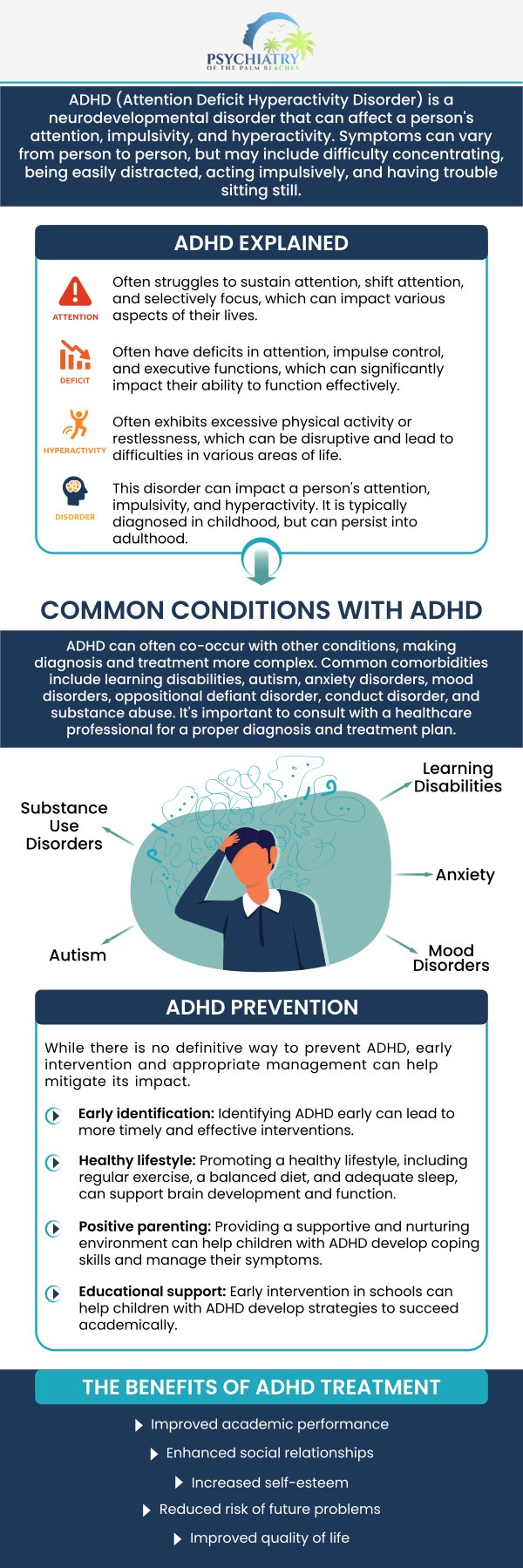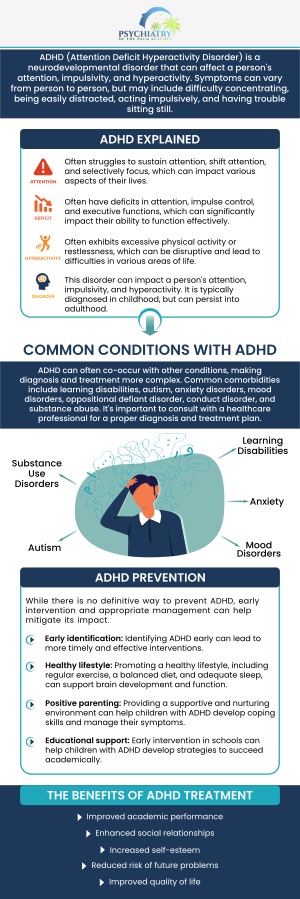Understanding ADHD in Adults: Symptoms, Causes, and Treatment Options
Some of the common symptoms of ADHD are poor organizational skills, lack of attention and focus, restlessness, forgetfulness, and extreme impatience. We help provide you with the tools and knowledge to best manage your symptoms for an overall better quality of life. If you are an adult and you are suffering from Attention-deficit/hyperactivity disorder (ADHD), please visit Psychiatry of the Palm Beaches. For more information, contact us or schedule an appointment online. Visit Psychiatry of the Palm Beaches serving Jacksonville, Boynton Beach, Palm Beach Gardens, Stuart, Royal Palm Beach, Port St. Lucie, Melbourne, Fort Lauderdale, and Jupiter, FL.




Table of Contents:
What are the signs of ADHD in adults?
What happens to undiagnosed ADHD in adults?
What is the first line of treatment for adults with ADHD?
What should adults with ADHD avoid?
Signs of ADHD in adults can include a wide range of symptoms that can vary in severity and duration. Some common signs include:
● Difficulty paying attention and staying focused – Adults with ADHD may have trouble completing tasks and may struggle to stay on task for extended periods. They may also have difficulty following through on instructions and may become easily distracted.
● Impulsivity – Adults with ADHD may act on impulse without thinking through the consequences of their actions. They may struggle with interrupting others, acting impulsively in social situations, and making hasty decisions.
● Restlessness – Adults with ADHD may have a hard time sitting still and may feel fidgety or restless. They may also have trouble relaxing and may have a hard time falling asleep.
● Disorganization – Adults with ADHD may have trouble keeping their surroundings and their schedule organized. They may have difficulty with time management and meeting deadlines. They may have trouble keeping track of important documents and appointments.
● Forgetfulness – Adults with ADHD may have trouble remembering things, including appointments, birthdays, or important tasks that need to be done.
● Difficulty controlling emotions – Adults with ADHD may have trouble regulating their emotions, leading to feelings of frustration, anger, and irritability.
● Difficulty maintaining relationships – Adults with ADHD may have trouble building and maintaining relationships due to their impulsivity and difficulty with communication.
If ADHD is not diagnosed in adults, it can lead to several difficulties in daily life. Adults with undiagnosed ADHD may have trouble with time management and organization, leading to problems at work or in relationships. They may also struggle with impulsivity, which can lead to poor decision-making and difficulty controlling emotions. Additionally, adults with undiagnosed ADHD may have a higher risk of developing other mental health conditions such as depression, anxiety, or substance abuse. Without proper diagnosis and treatment, these symptoms can significantly impact an individual’s quality of life.
The first line of treatment for adults with ADHD typically includes a combination of medication and therapy. Stimulant medications, such as Ritalin, Adderall, and Vyvanse, are commonly prescribed to help manage symptoms of inattention, hyperactivity, and impulsivity. These medications can help to increase the levels of neurotransmitters, such as dopamine and norepinephrine, in the brain, which can improve focus and attention. Non-stimulant medications, such as atomoxetine, bupropion, and antidepressive are also sometimes prescribed.
In addition, therapy can help individuals with ADHD learn coping strategies and improve their overall functioning. Cognitive behavioral therapy (CBT) is a popular choice for adults with ADHD, as it can help them identify and change negative thought patterns and behaviors that contribute to their symptoms. Mindfulness-based therapies, such as Mindfulness-based Stress Reduction (MBSR) or Mindfulness-based Cognitive Therapy (MBCT) are also effective for ADHD. Group therapy or support groups may also be beneficial for adults with ADHD, as they can provide a sense of community and support.
Adults with ADHD should avoid certain behaviors and situations that can exacerbate their symptoms and make it more difficult to manage their condition. Some things that adults with ADHD may want to avoid include:
● Procrastinating on important tasks or projects
● Taking on too many responsibilities at once
● Multitasking, which can lead to feeling overwhelmed and scattered
● Staying in environments with a lot of distractions
● Abusing substances, such as alcohol or drugs, which can worsen symptoms
● Engaging in impulsive or risky behaviors
● Consuming a diet high in sugar and processed foods, which can negatively impact the brain and exacerbate symptoms
● Not taking medications as prescribed
● Not seeking professional help when needed.
Each person’s experience with ADHD is unique, so what works for managing symptoms for one person may not work for another. It’s important to work with an experienced psychiatrist to develop a personalized plan to manage symptoms.
Stefanie’s Approach to Understanding and Treating ADHD in Adults
At Psychiatry of the Palm Beaches, Stefanie provides personalized care for adults with ADHD. By addressing symptoms like impulsivity and chronic disorganization, Stefanie helps adults identify the causes of their ADHD and offers tailored treatment plans that include therapeutic interventions and medication to manage symptoms and enhance life skills. By examining symptoms such as difficulty with focus, time management, and emotional regulation, Stefanie helps patients identify the causes of their ADHD. Through individualized treatment plans, Stefanie supports adults in managing ADHD symptoms and improving their daily lives.
For more information, contact us or schedule an appointment online. We have convenient locations to serve you. We serve patients from Boynton Beach FL, Delray Beach FL, Palm Beach Gardens FL, Jupiter FL, Stuart FL, Palm City FL, Royal Palm Beach FL, Wellington FL, Citrus Ridge FL, Jacksonville FL, Riverside FL, Port St. Lucie FL, Beau Rivage West FL, Melbourne FL, Palm Bay FL, Fort Lauderdale FL, Hollywood FL, Jupiter FL, North Palm Beach FL, and surrounding areas.
Check Out Our 5 Star Reviews



Additional Services You May Need
▸ Mental Wellness
▸ Relationship Coaching
▸ Depression and Mood Disorders
▸ Women’s Health
▸ Panic Disorder
▸ Medications Management
▸ Men’s Health
▸ Individual Psychotherapy
▸ Bipolar
▸ ADHD
▸ Geriatric Mental Health
▸ Couple’s Counseling
▸ Obsessive Compulsive Disorder
▸ Social Phobia Treatment
▸ Eating Disorders
▸ Post Traumatic Stress Disorder
▸ Psychotic Disorders


